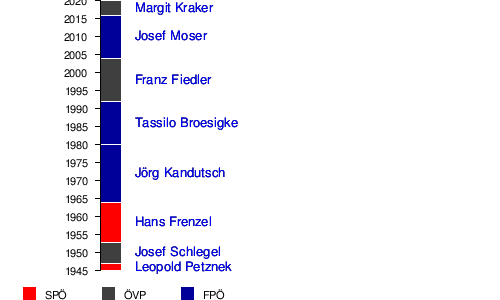Court of Auditors (Austria)
|
|||
|---|---|---|---|

|
|||
| State level | Federation | ||
| Position of the authority | Independent body of external public financial control for the federal, state and local governments | ||
| founding | 1761 | ||
| Headquarters | Vienna | ||
| Authority management | Margit Kraker | ||
| Budget volume | EUR 36 million (2020) | ||
| Website | rechnungshof.gv.at | ||

The Court is in Austria an independent organ of the National Council . It is responsible for auditing the financial management - i.e. the financially effective activity - of the federal government , the states and the municipalities with more than 10,000 inhabitants. Also enterprises , foundations , funds under public law and entities to which the public is at least a 50% stake, are obliged to stand on its request the audit.
The audit office determines the subjects, dates and intensity of the audit itself. It can, however , be requested by the National Council or a state parliament at any time to carry out a specific audit.
Each year, the Court of Auditors submits several Court of Auditors reports to Parliament on the results of its audits for computational and accounting accuracy, but also for efficiency , legality and expediency . (In 2012 there were 12 reports with 57 contributions.) The reports are published on the website of the Court of Auditors. The Federal Audit Office and the income report are also prepared by the Court of Auditors. In the case of audits at the request of a country, the relevant Court of Auditors report is sent to the country.
In addition to the (Federal) Audit Office, the nine federal states of Austria have each created their own control body in their respective state constitutions, which in Vienna is called the City Audit Office (formerly the Control Office) and in other countries the State Audit Office.
According to the statutes of the International Organization of Supreme Audit Institutions, the President of the Court of Auditors is automatically its Secretary General.
organization
The President of the Court of Auditors presides over the Court of Auditors. This is elected by the National Council for a period of 12 years and sworn in by the Federal President . He cannot be re-elected. The President of the Audit Office is politically responsible to the National Council.
The current President of the Court of Auditors is Margit Kraker . This was elected by the National Council on June 16, 2016 at the suggestion of the SPÖ and ÖVP .
As of January 1, 2016, the Court of Audit had a total of 304 employees (with 323 posts) and a budget of € 32.9 million in 2016.
history
The first forerunner, the general treasury , was established by Maximilian I in 1496 .
In 1761 Maria Theresia created a Hof-Rechen-Cammer , which was renamed Supreme State Control for a few years in 1794 . There was a decades-long tug-of-war over the powers and tasks of the institution between those who advocated cross-departmental controls and those who preferred to avoid more control.
On November 21, 1866, Franz Joseph I founded the Supreme Audit Office by imperial decree , which was directly subordinate to the emperor and whose head had ministerial rank. He started his activity on January 1st, 1867 and was not responsible for the countries of the Hungarian crown (Hungary, Croatia, Transylvania).
In addition, after the settlement with Hungary in 1867, the Joint Supreme Audit Office was set up for the jointly financed affairs of both parts of Austria-Hungary . (It became obsolete when Hungary left the Real Union with Austria on October 31, 1918.)
In November 1918 the Supreme Audit Office was subordinated to the German-Austrian State Council . On February 6, 1919, the State Audit Office, subordinate to Parliament, was established by law , and since November 10, 1920 (when the Federal Constitution came into force ), the Audit Office of the Republic of Austria . It did not exist from 1938 to 1945. The first president after the Second World War was Leopold Petznek .
Court of Auditors

- December 17, 1945 - February 23, 1947: Leopold Petznek
- February 23, 1947 - June 2, 1953: Josef Schlegel
- June 2, 1953 - April 20, 1964: Hans Frenzel
- April 20, 1964 - June 30, 1980: Jörg Kandutsch
- June 30, 1980 - July 1, 1992: Tassilo Broesigke
- July 1, 1992 - June 30, 2004: Franz Fiedler
- July 1, 2004 - June 30, 2016: Josef Moser
- July 1, 2016 -: Margit Kraker
See also
- City Audit Office Vienna
Web links
- The Court of Auditors
- Entry on Court of Auditors (Austria) in the Austria Forum (in the AEIOU Austria Lexicon )
- Presidents of the Court of Auditors since 1945 on parlament.gv.at
Individual evidence
- ↑ Federal Finance Act 2020. (PDF) Federal Ministry of Finance, accessed on June 21, 2020 (page 550).
- ↑ Article 126b B-VG (RIS). Retrieved April 17, 2018 .
- ↑ Court of Auditors: Mission and benefits ( Memento of the original from May 29, 2011 in the Internet Archive ) Info: The archive link was inserted automatically and has not yet been checked. Please check the original and archive link according to the instructions and then remove this notice. , accessed June 21, 2011
- ↑ Article 122 para. 4 B-VG B-VG RIS , accessed on May 7, 2020
- ↑ Article 123 para. 2 B-VG B-VG RIS , accessed on May 7, 2020
- ^ Court of Auditors: Facts and Figures , accessed on April 29, 2016
- ↑ ALEX ( ÖNB ): Reichsgesetzblatt RGBl. No. 140/1866 (from p. 393) (imperial ordinance of November 21, 1866)
- ↑ ALEX (ÖNB): State Law Gazette StGBl. No. 85/1919 (from p. 146) (Law of 6 February 1919 on the State Audit Office)
Coordinates: 48 ° 12 ′ 44 ″ N , 16 ° 23 ′ 14 ″ E
